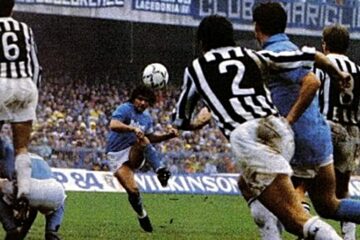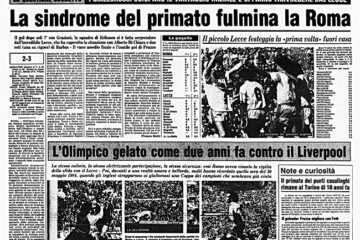1982 | Schumacher – Battiston clash in the most dramatic semifinal of the World Cup! FRG-France 3-3!
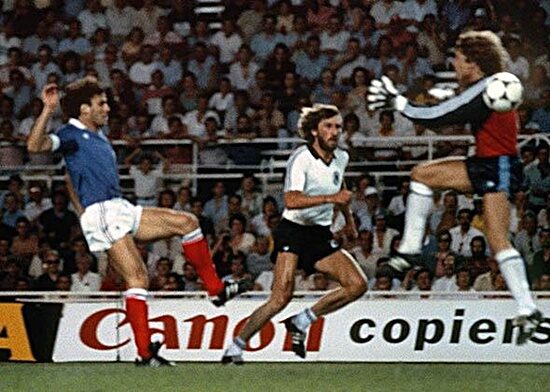
West Germany – France 3-3!
It is one of the semi-finals of the World Cup played on Friday, July 8 in Seville, between France and West Germany, which turned out to be one of the most iconic and dramatic challenges in the history of the World Cup: This semi-final of this Cup of v. 1982, stands out among others, for the terrible intervention of the German goalkeeper Harald “Tony” Schumacher against Patrick Battiston, which left the French defender unconscious, with two broken teeth and three cracked ribs.
What is more ironic, Schummacher was not even punished with a yellow card and the referee Charles Corver did not even give a foul!!! Entering and exiting coma; injuries that are more likely to be visible after a car accident, but……what we will show as follows is just one case that happened during a football match.
The match ended 3–3 after extra time and went to penalties – the first World Cup match to be decided on penalties. Despite Uli Stielike being the first player to miss one for the Germans, Shumaker finished as a hero by denying two penalties from Didier Six and Maxime Bosis. West Germany won 5–4 and reached the final.
In a book titled “Twelve Yards”: The Art and Psychology of the Perfect Penalty, Ben Lyttleton details how each of the key players in that game saw the Shumaker / Battiston collision episode and how it affected their mentality.
In this excerpt, he explains what happened after the final whistle on that challenge. The match ended at 11:41 p.m. local time, which explains why Shumaker’s incident barely registered in the next day’s analysis. “Fabulous!” was the headline in “L’Equipe”, praising the French team for its attacking strength and the coach Michel Hidalgo for introducing three players like Alain Giresse, Michel Platini and Bernard Gengini. “Si près du paradis” – “So close to paradise” – was the inside headline: “It’s hard, so hard to take, more than we can say. Germany will play in the final, but France, we can say without bitterness or patriotism.
This was a great day for French football”. “L’Equipe” magazine, with an image of Shumaker’s thigh in contact with Batiston’s jaw. “A story of unpunished violence. It’s just a moral tale to tell our children.” Hidalgo changed his tone from brave loser to angry victim. ” You say that Corver is an international referee? I have my doubts if he endangers the safety of the players in this way.” 1!! Platini sends a calibrated pass behind the German defense. Kaltz can’t stop the ball that reaches Battiston’s feet. “There was no opponent to stop Shumaker’s goal” as Patrik Battiston expressed himself in the book “12 Yards” (Twelve Yards).
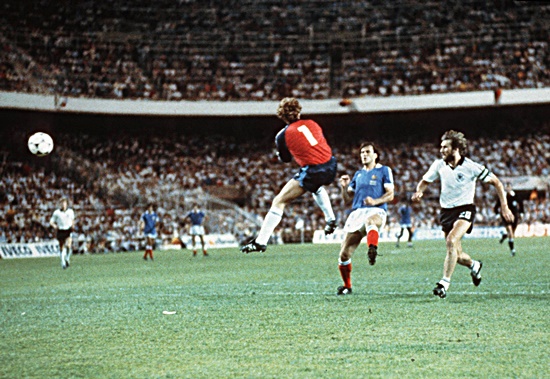
Battiston, who had entered the field as a substitute less than 10 minutes before the incident, is given a ball in front, taking it free, in front of the German goalkeeper who approaches him, narrowing the range of action…….
Schumacher crashes over the number 3 to Frances with her feet up! The shot of the ball by the French defender is tentative. Off target. Television cameras and the referee’s eyes follow the ball as it rolls wide of the German goal. 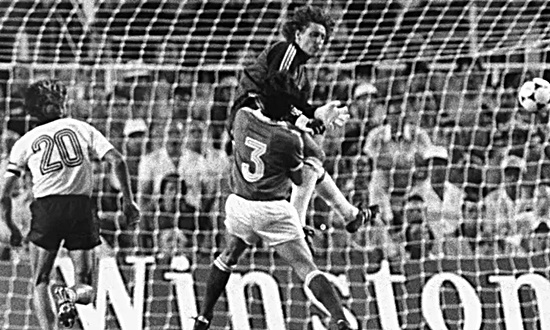
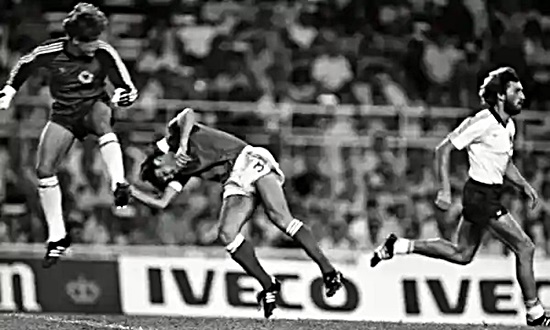
However, a terrible scene is unfolding. Battiston lies on the ground. We worry about his health and even his life. His fist is clenched in an unnatural, disturbing way. His arm falls “snapped”. Colleagues quickly gather and make an urgent call for help.

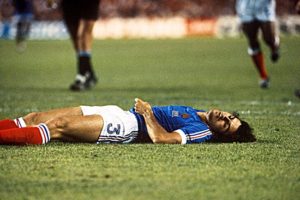
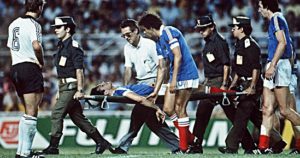
II
What happened? “He had no pulse”, said the captain of that legendary France, Platini. “He looked so pale.” Seven minutes pass before a stretcher materializes. Battiston is placed on it and blacked from the field of play. His arms are not folded across his chest. One falls under the stretcher, dead, witnessing the horror of what just happened. Platini grabs his friend’s arm. He holds, caresses, kisses Battiston and encourages him.
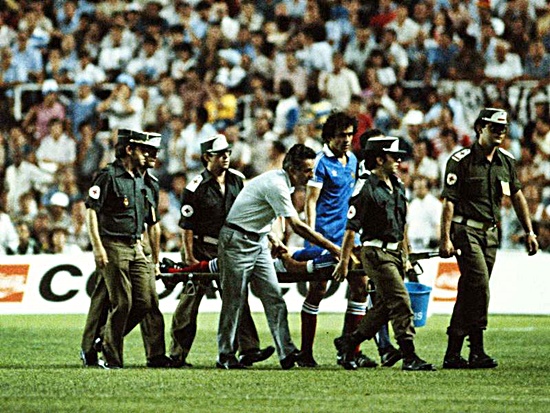

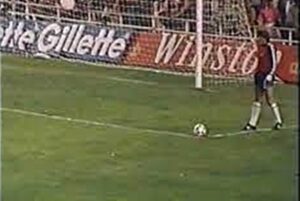
Meanwhile, Harald Schumacher remains silent in his area. Calm as if nothing had happened, the goalkeeper of West Germany seems to be getting impatient with the delay. His hands are on his hips and he has placed the ball on the edge of the small area of his goal for the return kick. I have to make my shot, his body language suggests. Meanwhile, Battiston had hit the ball while Shumaker had hit Battiston badly.
While the player of France was trying to ease what had been a powerful run, to “soften” the close contact, on the contrary Shumaker was speeding up and as if he wanted to make the contact harder. Thus, the German goalkeeper was heading towards the opponent while the ball passed under his left arm at the border of the area. Shumaker flew into the air, twisted his hip and raised his strong forearm to the Frenchman’s jaw. He would say later that he didn’t mean to hit him with his knees.
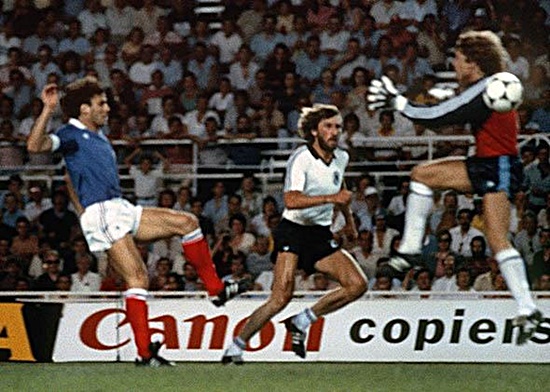
Battiston immediately falls on the green grass of the field unconscious. It would be six months before he fully recovered. Referee Charles Corver completely lost control of this incident. “Unfortunately I didn’t see the collision because I was following the ball that went out of the goal,” he told L’Equipe in 2012. “I immediately asked if my assistant referee saw it and he told me that in his opinion, it wasn’t intentional, that’s why I couldn’t do anything”.
The appointment of the Dutch referee in charge of this major challenge carried a bitter irony for the French who opposed his selection, having refereed their 3-1 defeat to England earlier in the tournament. Everything that happened was “paid” with just one return kick. This was the decision that stemmed from the most brutal act ever to take place on a World Cup challenge field. No free kicks. No red card. Not even a yellow one. “A deep injustice,” said team member Alan Giresse to “Metro news” before France and Germany met in the quarterfinals of the World Cup in the v edition. 2014. “We were convinced that the referee was going to blow the whistle for a foul. Then we saw the state Patrick was in and we were immediately worried about his health. Will he get up? Is his life in danger? After this incident , the team was bored.
We didn’t think about the game anymore.” This was, perhaps, the greatest World Cup match of all time. A 3-3 draw after extra time, which would be decided by penalties. Schumaker saved two and West Germany earned a place in the final against Italy. The German goalkeeper rejoices with his hand and fist raised for the success that only the Germans thought was deserved. The fact that they recovered from a 1-3 deficit after extra time to level the game at 3-3 was commendable, but what “Tony” Schumacher did remained a disgraceful and unpleasant gesture even though the German team with Karl-Heinz Rummenigge and Klaus Fischer had tied a contested game.
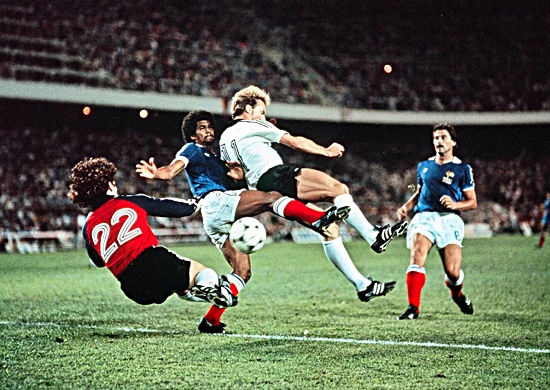
The penalty shootout, the first of the World Cup in the semi-finals, was a new experience for everyone and the Germans who survived it. But Schumacher, even though he received two penalties, could not be said to be a hero. His action lowered the values. He was now the prototype of a monster.
In fact, it’s a very charming term that conjures up the notion of a fierce villain. It also brings to mind qualities that were completely missing from the intense Cologne goalkeeper as a player with a big heart, playful, fun and humorous. “I observed his behavior, the way he clashed with Dominik Rocheteau and Didier Six,” Battiston told AFP. “I thought he was very electrified in that game, very excited. I told the other players about it when I was sitting on the bench.”
“Tony” Schumacher seems to have “extinguished a cigarette in his arm” to show his girlfriend that he was able to overcome the pain. After each loss, Schumacher would go home and punch a red sandbag until his fingers bled. Shumaker is a strong man. However, that day proved to be weak. The enormity of what he had done was not lost on him. However, he feels a lot of regret for July 8, 1982. “I didn’t want to hurt him, but I would do the same thing again if the action was repeated”, he would say to “Le Figaro”. “It was the only way to get the ball.” However, he knows that he should have controlled his exit maneuver against Batiston for the opponent’s safety and shown some compassion.
He also knows he shouldn’t have celebrated the penalty save; an adrenaline rush. I’m sorry, very sorry, he told the reporter who informed him of the extent of Batiston’s injuries, and that he would pay for the bills for the broken teeth and any treatment for the damaged ribs; And, finally: “I regret that the German delegation and I did not go to the hospital to get the news about Patrick Battiston,”. “Secretly, I was afraid that Batiston was seriously injured, maybe lying in a coma,” Shumaker himself admitted. Shumaker was as frustrated by his reaction as the challenge itself. But his performances and outward actions in that match seemed to be evidence of sure opposition. “Maybe he really felt guilty, you can draw all kinds of conclusions about what he felt. All I know is that Shumaker was someone who wanted to win at all costs and he went too far that night,” Battiston said.
III
The “curtain” was slowly falling. After the match, the press focused on the result of what had been a great, exciting match. Hidalgo was praised for the composition of his team with strikers and for the proper performance displayed by France. In fact, just a few days after the match, the Batiston-Shumaker clash became the main talking point. What remained after Schumacher’s attack on Battiston was more like an explosion of anger. They went so far as to call him “SS”. Shumaker was portrayed as a pathological brute. Anti-German sentiment flared in France.
The debate went even further when “Schumacher beat Adolf Hitler” in a newspaper poll of France’s greatest enemies. Hostility between the countries still continued: the middle of the magazine “L’Equipe” was occupied by anti-German slogans and also photos showed cars with German license plates parked in French campsites which had slashed tires and broken windows. To improve relations, Chancellor Helmut Schmidt sent an open letter of condolence to President Francois Mitterand. “Our hearts go out to the French, who deserved to go as far as the Germans.” After Italy beat FRY in the final – on the pages of the magazine “L’Equipe” it was written in big letters: “Justice”!!! Someone had the bright idea to send Schumaker on a diplomatic mission to France to apologize in person. He traveled to Metz the day before Batiston’s wedding and presented him with an FC Köln flag and an….. apology.
But the trip was not successful. “Schumacher forgets himself,” said German magazine Kicker. “It was a gesture of reconciliation with unpleasant consequences.” The pair were pictured sitting next to each other at a hastily arranged press conference, looking in opposite directions. Schumaker, who refused questions from the French press, interrupted the conference. “This is something that only concerns Batista and me,” he said. “If I had known, I would have brought my German journalists with me.” The peace offer had turned ugly. “The bad guy just wanted to make fun of the good guy,” wrote Le Figaro. “They put me in a room,” Shumaker said. “When I opened the door, there were a lot of journalists. I didn’t expect that. I apologized. But I was not satisfied with the way the meeting was organized. This was also presented with a reaction on my face.” “I still could not understand the purpose of this debate”, the German goalkeeper would say. “I was a completely apolitical person, but suddenly I was responsible for the anti-German resentment that broke out in France. I felt like I was going to instigate World War 3.
I had never felt so much hatred before.” The visit was “a wash”. Chancellor Helmut Schmidt was forced to send a telegram to President Francois Mitterrand. Together they issued a joint statement in an attempt to ease tensions. A day after the failed reconciliation, Mitterand considered asking Hidalgo to make his players state publicly that they had no problem with Shumaker. Hidalgo had his answer ready: “What, ask them to take Shumaker on vacation with them?”
This gave France Football magazine an idea: it asked the French team where they would take Shumaker on vacation. Here are the answers from some of the players: Zhires: To visit Padirac Cave. Platini: To climb the Grandes Jorasses mountains [on Mont Blanc]. Bosis: To climb the heights of Vallée Blanche [on Mont Blanc]. Rosheto: To watch a sunset from the cliffs of Étretat. Trezor: To make a parachute jump with a delayed opening. Batiston: To help me pick mushrooms in the forest, since I still can’t bend. Platini, the French captain, believes France needed to lose this game – which in French folklore is simply called Sevilla 82 – to help them win their first trophy, the European Championship, two years later. “The legend of that match comes from the fact that we lost it,” Platini said. “By losing him, we became a great team. It was the end, but also the beginning of something. In the history of French football, the two turning points were Sevilla 82 and the final of the 1998 World Cup. Sevilla marked a generation of football fans, which gave them a collective state of mind: this is why books and plays have been written about the game. No film in the world could have given such conflicting emotions as Sevilla 82. It is certainly a beautiful moment in my career. It’s the moment that makes you say afterwards: ‘I’m glad I was there!’ even if we were losing.”
IV
However, two years after that semi-final, a friendly match was arranged between them where the West Germans played in France in April 1984. The team bus left for the stadium. Shumaker was listening to a song called “Revenge” by Peter Maffay. “Knock me dead ’cause that’s the only way you can be sure I won’t defend myself,” the song’s lyrics say. “When I walked into the Strasbourg stadium for our first international match against France after the World Cup, I saw myself as a life-size doll hanging on a tripod,” said Shumaker. The field was surrounded and secured by police with batons.
Otherwise the French would have torn me apart. There were banners with swastikas and Nazi slogans everywhere. “Eggs, potatoes, apples, tomatoes, stones – they threw everything at me. They booed and raged every time I had the ball, but they couldn’t make me feel small.” His mother used to tell him that when he scored a goal he should get up immediately to give him safety. If he was afraid, he didn’t show it. Like July 8, 1982. “I knew what I had to do,” he said. “If I didn’t resist that pressure, my international career was over.
I was fully focused and had prepared myself with autogenic training.” Shumaker’s performance is extraordinary, he punches, deflects and cuts balls while breaking the shares of the French. Here comes a ball that is hit hard from a long distance. A headbutt in close range that he beats. Didier Six tries to hit him again from distance, but he punches him. In the end, sometime and late, Shumaker “surrenders”.
France scores to win the match 1-0, but Toni Schumacher won’t be hitting the sandbags tonight. “France won 1-0, but I made a strong performance”, said the great goalkeeper of the German representative. “As the game progressed more and more now the applause was coming from the crowd.” Things cooled down. Shumaker had little redemption. “I changed jerseys with Battiston,” he said. “But in the dressing room, not on the field.” A full forty years have passed since the Seville tragedy.. “I have forgiven him,” Batiston would say. “As time goes on, I understand that people will always remember this case. But now it’s over.” Shumaker believes in heaven and has said that it must be better than here.
He was expelled from the German football fraternity in 1987 after his autobiography detailed what he claims were widespread doping practices in German football. In 1982, Italy were champions after beating the West Germans and their goalkeeper in the final. In 1986 Shumaker couldn’t shut down the great Diego Maradona and Argentina as they lost again in the final in Mexico.
The Germans would win the World Cup in 1990 but without Shumaker. There was no place for him in the team of that edition. Now the image of a great goalkeeper like Shumaker in the World Cup is all “stamped” in a summary of two failed finals and this attitude: Seville, July 8, 1982;
Hands on hips, waiting to hit the ball as quickly as possible while his opponent Battiston lay unconscious on the ground.
By: Pjerin Bj
© Copyright protected | The exclusivity on this page is dated October 20, 2022
________________
Sports Vision + /The Hour of The Champions since 2013
Photos were taken from Google. Please if you have any issue on photos contact us first.
Thank you
Follow us: Facebook: https://www.facebook.com/VizionSportiv Dailymotion: https://www.dailymotion.com/kinetografiashqiptareartisporti Blog: https://pierosportvision.blogspot.com/
Discover more from Sports Vision +
Subscribe to get the latest posts sent to your email.


